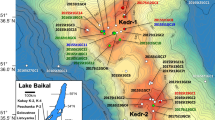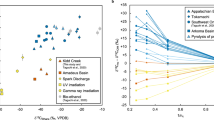Abstract
Previous interest in light hydrocarbons from geothermal systems has focused principally on the origin of the methane1 and the estimation of subsurface temperatures from the carbon isotopic content of coexisting methane and carbon dioxide1–3. Higher molecular weight hydrocarbons were first reported in gases from Yellowstone National Park4, and have since been found to occur commonly in geothermal emanations in the western United States5. Isotopic measurements of individual geothermal hydrocarbons are now reported which help to explain the origin of these hydrocarbons. The thermal decomposition of sedimentary or groundwater organic matter is a principal source of hydrocarbons in four geothermal areas in western North America.
This is a preview of subscription content, access via your institution
Access options
Subscribe to this journal
Receive 51 print issues and online access
$199.00 per year
only $3.90 per issue
Buy this article
- Purchase on Springer Link
- Instant access to full article PDF
Prices may be subject to local taxes which are calculated during checkout
Similar content being viewed by others
References
Craig, H. Geochim. cosmochim. Acta 6, 53–92 (1953).
Hulston, J. R. & McCabe, W. J. Geochim. cosmochim. Acta 26, 399–410 (1962).
Panichi, C., Ferrara, G. C. & Confiantini, R. Geothermics 5, 81–88 (1977).
Gunter, B. D. & Musgrave, B. C. Geochim. cosmochim. Acta 35, 113–118 (1971).
Nehring, N. L. & Truesdell, A. H. Geotherm. Res. Counc. Trans. 2, 483–486 (1978).
Matthews, D. E. & Hayes, J. M. Analyt. Chem. 50, 1465–1473 (1978).
Des Marais, D. J. Analyt. Chem. 50, 1405–1406 (1978).
Hayes, J. M., Des Marais, D. J., Peterson, D. W., Schoeller, D. A. & Taylor, S. P. in Advances in Mass Spectrometry (ed. Daly, N. R.) 475–480 (Heyden, Philadelphia, 1977).
Dayhoff, M. O., Lippincott, E. R., Eck, R. V. & Nagarajan, G. Thermodynamic Equilibrium in Prebiological Atmospheres of C, H, O, N, P, S and Cl (NASA SP-3040, Office of Technology Utilization, NASA, Washington DC, 1967).
Gold, T. & Soter, S. Scient. Am. 242(6), 130–137 (1980).
Galimov, E. M. Izotopy Ugleroda ν Neftegazovoy Geologii (Nedra, Moscow, 1973).
Craig, H. in Nuclear Geology of Geothermal Areas (ed. Tongiorgi, E.) 17–54 (CNR Laboratorio Di Geologia Nucleare, Pisa, 1963).
Silverman, S. R. Proc. 8th Wld Petrol. Congr. 2, 47–54 (1971).
Melander, L. & Saunders, W. M. Jr Reaction Rates of Isotopic Molecules (Wiley, New York, 1980).
Trusdell, A. H. & Fournier, R. O. Conditions in the Deeper Parts of the Hot Spring Systems of Yellowstone National Park, Wyoming (Open File Rep. 76–428, US Geological Survey, Menlo Park, 1976).
Welhan, J. EOS 61 (46), 0–120 (1980).
Author information
Authors and Affiliations
Rights and permissions
About this article
Cite this article
Des Marais, D., Donchin, J., Nehring, N. et al. Molecular carbon isotopic evidence for the origin of geothermal hydrocarbons. Nature 292, 826–828 (1981). https://doi.org/10.1038/292826a0
Received:
Accepted:
Issue Date:
DOI: https://doi.org/10.1038/292826a0
This article is cited by
-
Resource partitioning and amino acid assimilation in a terrestrial geothermal spring
The ISME Journal (2023)
-
Low 13C-13C abundances in abiotic ethane
Nature Communications (2022)
-
Timing and origin of natural gas accumulation in the Siljan impact structure, Sweden
Nature Communications (2019)
-
Hydrochemical variations in selected geothermal groundwater and carbonated springs in Korea: a baseline study for early detection of CO2 leakage
Environmental Geochemistry and Health (2017)
-
Stable carbon and hydrogen isotopes of gases from the large tight gas fields in China
Science China Earth Sciences (2014)
Comments
By submitting a comment you agree to abide by our Terms and Community Guidelines. If you find something abusive or that does not comply with our terms or guidelines please flag it as inappropriate.



